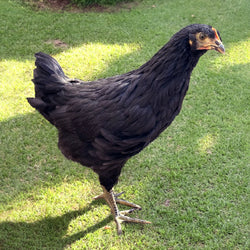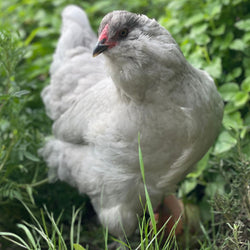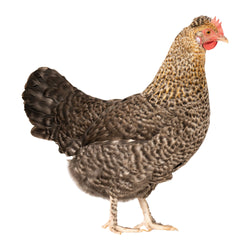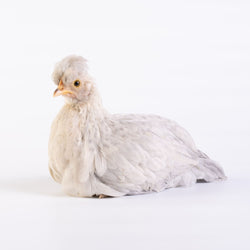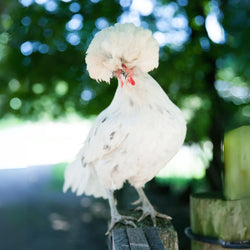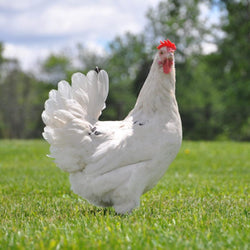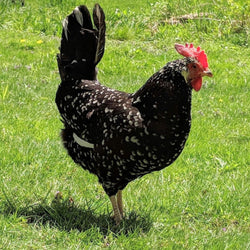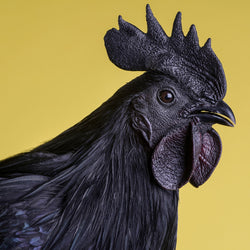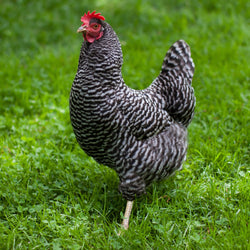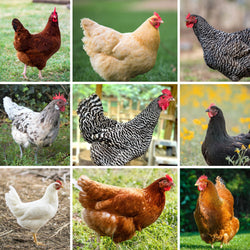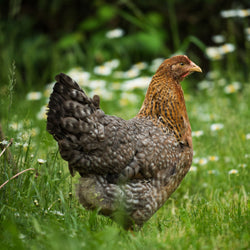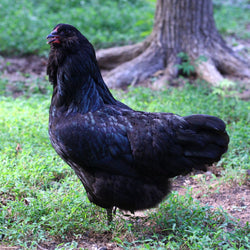page=9/--
Frequently Asked Questions
Here we answer the most commonly-asked questions about ordering, chicken care, and more.
Will chickens help eat ticks and mosquitoes in my yard?
Chickens love to eat mosquitoes and ticks--that's great news! But if you keep chickens, will that mean you can dump your other bug protection methods? Probably not, but your chickens will certainly help! Ask yourself: if you spent all day swatting mosquitoes one or even a few at a time--and even if you were GREAT at hunting them down--would your yard suddenly be free of mosquitoes? That's doubtful. Mosquitoes will just fly in from your neighbor's yard. They don't know a whole lot about property lines. If your neighbor has a wet spot where they breed--even just puddle beneath a...
Read MoreWill all of my blue chicks actually be blue?
Depending on which chicken breed and color you order at My Pet Chicken, some will be guaranteed to be all Blue, Black, or Splash. At the same time, others will be hatched and sold as mixed flock colors including blue, black, and splash. How do Chickens get Blue Feathers? When a blue rooster and a blue hen reproduce, even though they're both blue, they only pass the blue gene to about half of their offspring. About 25% of their offspring will be black... and the last 25% or so will be splash. Blue: The genes for "blue" are actually more...
Read MoreCan I feed my chickens black oil or striped sunflower seeds?
Sunflower seeds are a good treat for your chickens. They're widely available, chickens typically love them, and for a treat, they're quite nutritious. They contain methionine, for example, an important amino acid for birds. There is lots of vitamin E, too! And their high magnesium content is also a benefit for your flock's calcium metabolism and smooth muscle tone, both important in laying. But there are a couple different kinds of sunflower seed. Does it matter what kind of sunflower seed you offer your chickens? There are a few differences between striped and black oil sunflower seeds. Most particularly, black...
Read MoreThere are so many different terms for chickens--juvenile, cockerel, pullet, chick, hen, rooster, peep, biddy, started pullet, point-of-lay pullet, broody, brood, flock---what do they all mean?
There ARE a lot of different terms for chicken, aren't there? It can be a little confusing, especially when you're just starting out. So let's define these terms. Male and female chicken terms Hen, rooster, roo, capon, chicks, peeps: You probably know the terms "hen" and "rooster," which refer to female chickens and male chickens respectively. "Roo" is just short for "rooster," and "capon" refers to a neutered rooster. What you may not know is that we don't normally refer to young chickens or chicks by those terms. A baby chick is not a hen or a rooster. "Hen" and...
Read MoreWhat's the difference between Breeds, Designer Chicken Breeds, and Varieties of chicken?
Let's talk about Designer Chicken Breeds, Breeds, and Varieties, so you'll understand the differences in terminology. Designer Chicken Breed There are two main differences between Designer Breeds and real Breeds: Designer chicken breeds will not breed true, and they are not American Poultry Association (APA) recognized. Not recognized A Designer chickens such as Favaucanas are not an APA-recognized chicken breed, the same way a Goldendoodle---crossing a Golden Retriever and a Poodle---is not an American Kennel Club (AKC) recognized dog breed. That is to say: they are recognized in the sense that you've probably heard of them, but Favaucanas and Goldendoodles...
Read MoreWhat is the difference between different types of chicken feeds like starter, grower, finisher, layer, and developer?
Starter, grower, finisher, layer, and developer are all considered "complete feeds" to offer your chickens, but they come in different varieties,depending on your chicken's current needs. In other words, it's a lot like purchasing dog food for your dog or cat food for your cat. You may start your new pup on puppy feed, then move to an adult feed, and years later give him a feed designed for senior dogs. With a cat, you may start with kitten feed, and from there go to adult feed, or even hairball formulas. You might get grain free--or you might find they...
Read MoreWhat is a dual-purpose chicken?
In the modern day, factory farm chickens are kept for laying or meat production. Laying breeds, or "layers," tend to produce impressive quantities of large eggs and use most of their resources for egg production. Layers may also be called "production breeds," because they are kept specifically for the purpose of egg production. By contrast, "meat birds," often called "broilers," are large-bodied and grow extraordinarily fast. Many are just 6 weeks old when they are processed. "Processed" is a nice way of saying, "killed and butchered for market." So, a dual-purpose breed is generally regarded as a chicken breed that...
Read MoreWhat is sexing, autosexing, and sex-linked?
The word sexing simply refers to the process by which chicks are sorted into males and females. Chicks are not easy to tell apart because they don't have external sex organs like puppies are kittens... or cows, goats, sheep, horses, etc. So only experts with years of special training can "vent sex." They do that by looking at minute details of the birds' cloaca, and even then there's a chance that a baby chick can be sexed incorrectly. Read the related questions for details. Autosexing refers to breeds or varieties of chickens where the males and females hatch out with...
Read More







"The Clubhouse" Coop
Easy to assemble and built to last, the Clubhouse Coop is the perfect starter coop for a small flock.
